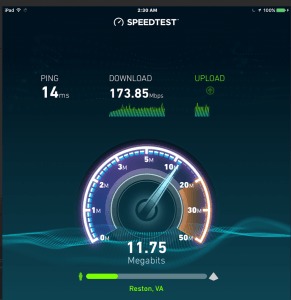
“Today, people living in Bucharest, Romania have access to much faster Internet than most of the U.S. That’s unacceptable and must change.” So went a tweet from Bernie Sanders, the presidential hopeful, as reported on CNN. Certain Romanians, proud of the average download speed of 95Mbps in Bucharest, saw an unwarranted sense of entitlement from Sanders. Why should Americans feel they deserved better technology than people elsewhere?
Other Romanians were wittier and more creative about it, and the champs might be the creators of a site we’ll call The Bernie Sanders Internet Speed Test. Try it. When I did, the site told me my speed was 44Mbps, or 1.1 times slower than the Bucharest average. Huh? When I measured my speed on my iPad via software the Ookla app, I got the results below:

Yep—174Mbps, with Comcast Blast’s service. Quite a difference from the supposed 44Mbps. What’s going on? Is the Romanians’ speed test really comparing apples and apples? I’m in Alexandria, VA, not that far from Reston, where Ookla did the measurement. Not that much of the Internet is between me and Reston—while goodness-knows-what exists between me and Romania.
I voted for Sanders in the Virginia Democratic Primary and am hardly the biggest fan of Comcast, but if what I suspect is true, the Bernie Sanders Internet Speed Test is about as credible as Donald Trump. Keep in mind that Sanders’ campaigners have nothing to do with the test. I’m still feeling The Bern.
Update, 1:25 p.m., March 5: I got an even better reading for my Comcast account, of nearly 180Mbps, when I used DSL Reports’ test, which relies on multiple ISPs. Here is what DSL Reports says: “This test does not piggy back a CDN (content delivery network) with an impressive list of cities but dodgy geo-location and shared servers. All test servers are dedicated to testing, are monitored, and are capable of multiples of the bandwdth actually required. If the servers get close to any capacity cap then the number of people per minute testing is throttled to keep results clean.” I then used an AT&T server in Mexico, via Ookla’s Speedtest.net, and got a still impressive 127Mbps. My own results from the Sanders site this time around? Somewhere in the neighborhood of 18Mbps, even less than before. Simply put, I’d wonder about the significance of the Sanders’ test if my situation is representative. Over at Reddit, others are asking similar questions.


































Hey there. The result you got is from the closest server to you, as you can see from the result. To be fair, the berniespeedtest.com uses an external server hosted in Frankfurt. The idea is simple, except for the people in Frankfurt, everybody is testing on neutral grounds, the external speed of their internet connection. As you well know, metropolitan server tests do not show the actual internet speed test you have, but the speed you have in comcast networks.
Hey, Bogdan, thanks for giving the world that wonderful gag site! The U.S. truly should be ashamed of its Net speeds, and, yes, everyone deserves speed. But let’s give Comcast its due. As you cans see from the update, I’ve gone outside the Comcast network. I’d welcome your reply. I’m not out to help Comcast here—rather, just to get at the truth.
Hi David,
Manny thanks for writing about this and yes, the main purpose of the website was to be funny and positive and bring a smile to people’s faces in a time when usually debates tend to heat up (elections everywhere on the planet).
And yes, the test ONLY calculates internet speed to external servers it does not calculate the local loops. From the technical point of view, speed to an external server will be significantly lower than speed to a local loop server. The server of berniespeedtest.com is and Amazon server in Frankfurt so it’s neither in Romania nor in the US as we intended to calculate only the external speed. If the server would have been in the US for example, it would’ve been very fast for some US ISP’s and slow for others (this also depends on pairing protocols and ISP agreements) and at the same time if the server would have been in Bucharest it would have been very fast for Romanians (especially from RDS) and slow for others.
In my case for example, my 1Gbps Telekom connection has very bad pairing with the rest of ISP’s in Romania. We tested it with the OOKLA model by having one Amazon Server in Bucharest but since Telekom and RDS are huger competitors, I was only getting 3.1 Mbps, 29, 3.3 and 3.8 Mbps tops results. When I switched to the neutral server I was back at 34 Mbps – 38 Mbps (wifi) and 88 – 91 Mbps (fiber). When I use a OOKLA speed test and OOKLA tests my connection to a local Telekom server near my location, the slowest speeds I get are around 112 MBPS.
Now, coming back from the more technical part, I hope nobody got offended from what we did, we are not related to Mr. Sanders and we did not mean to offend anybody. The speedtest applications in the end are a very subjective matter since the results depend on a variety of factors (wifi vs fiber, location, pairing, ISP protocols and many more) so basically, it’s hard for anybody to have the absolute truth on this. Knowing this, it is not rigged, it just uses one approach for testing speeds from the couple out there and just focuses on speed to an external server. Some connections will have better results than others.
I really hope you guys had fun with this and took your mind for a second from daily worries and just had a good smile 🙂
Bogdan
@Bogdan: Yes, I’ve had fun, too, regardless of our differences. Let’s hope Bernie or Hillary wins—lest President Trump invade Europe and mandate one testing methodology for all 😉 Well, that’s assuming he’s smart enough to care. But as we’ve seen so far, fate can be full of perverse surprises—so thanks again for the laughs to take our minds off the news.
David
Hehe, Yes David, the future of America is in the hands of America this year and most of the world still looks up to you guys so, hopefully the choice will be positive for the whole world 🙂
Let’s look at it from a different angle: the test gives me 25.70Mbps, 1.9 times below the average, but my speed is capped because I’m on the cheapest data plan my ISP offers (Gemenii Network, in Tei, Bucharest, if anyone’s curious). And this plan is only $7 a month. I think their top rung goes up to 150Mbps, six times as fast. (But it’s also three times as expensive.) And metropolitan speeds are much higher. How much do Americans pay for comparable speeds?
This site gave me 10.13 and the speedtest app gave me 180.83. Maybe they are testing upload speeds? 🙂 I got 11.90 upload according to the app which is much closer!
I’m surfing at the speed of LOL 🙂